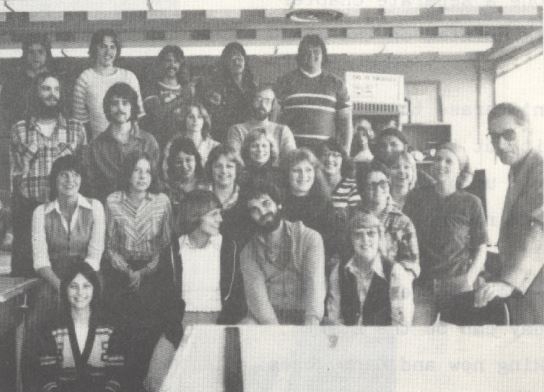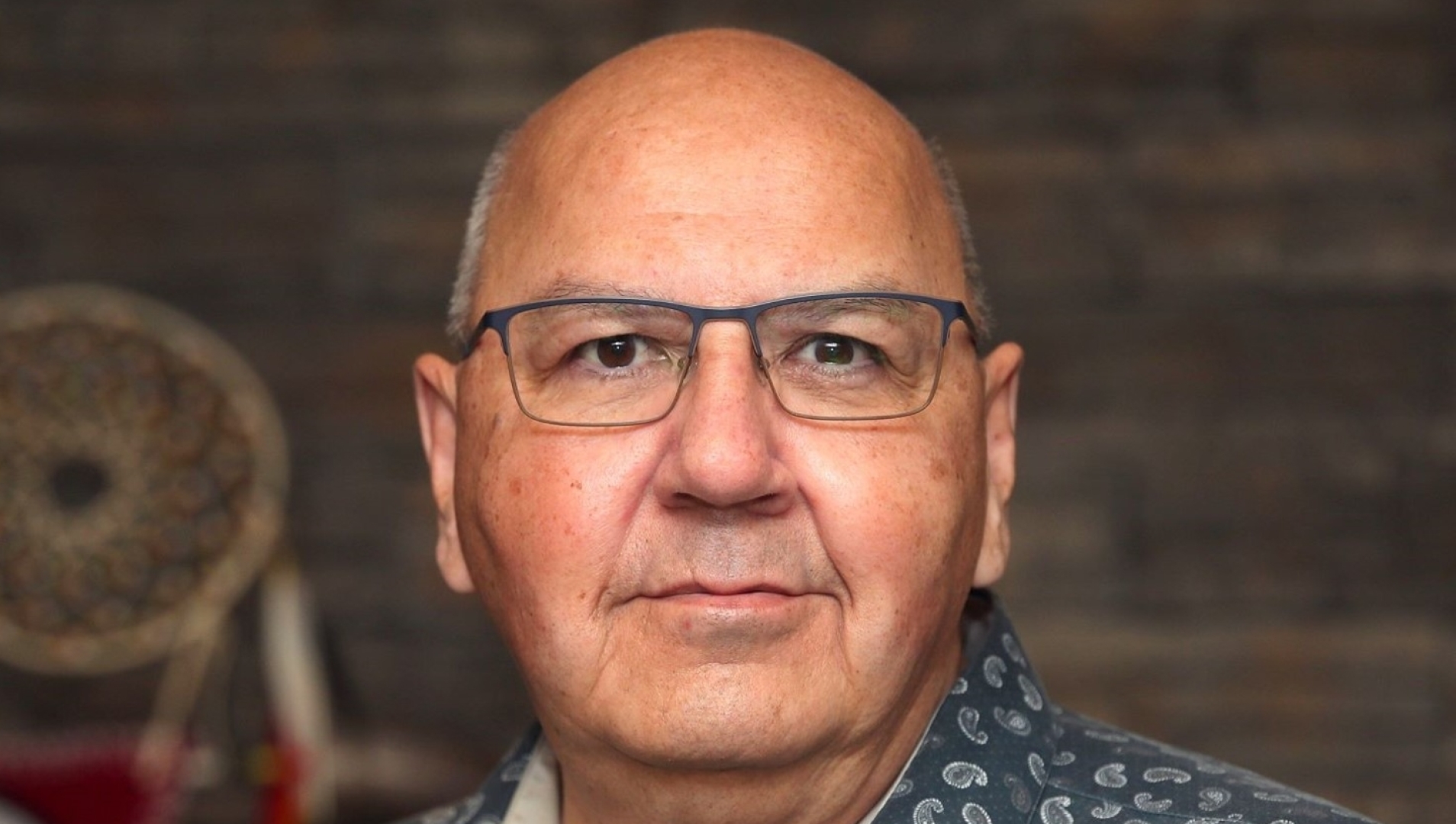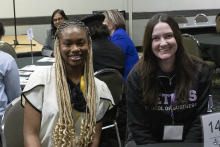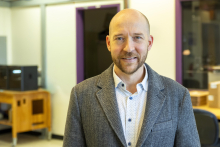Assiniboine graduate spends decades championing Two-Spirit and LGBTQIIA+ rights
December 30, 2024
When Albert McLeod first walked through the doors of Assiniboine College in the mid-1970’s he never envisioned how a certificate program in commercial art would help him find belonging, and eventually lead him to a career in advocacy and progress in the Two-Spirit (2S) and LGBTQIIA+ community.
“I attended Assiniboine College in 1976-77 when I was about 20-years old. I was living in The Pas at the time, and didn’t want to work at the mill, so I really didn't have a lot of prospects in terms of employment there. I always had an interest in art from childhood, and I came across an opportunity for training at Assiniboine.”
In looking at wanting to build a career in art, McLeod sent in a portfolio of his work to the college, along with an application. A short time later he would learn that he was successful, and within a couple of months he would pick up stakes and move south to Brandon. He recalled that during his time at Assiniboine, he occupied a basement suite. He, along with two other students who he had not met prior to coming to Brandon, would call that suite home for the next year.
This was McLeod’s first taste of city life. Prior to arriving in Brandon, he spent much of his youth in Cormorant, a small village north east of The Pas, Manitoba. A member of Nisichawayasihk Cree Nation and the Métis community of Norway House, those early years were foundational in McLeod’s connection with the land, and the peoples who call Turtle Island home. His childhood did not come without its share of challenges though. As a descendant of Scottish and Indigenous heritage, McLeod’s ancestry comes from the people of the Hudson’s Bay company and their local trading partners. He admits that his cultural background and being a closeted gay man in northern Manitoba at that time was a real challenge. The isolation felt by those in the queer community was substantial, he says, and acceptance still felt decades off, if ever it was going to arrive.
“Living in the north it was very racialized. I came from a mixed family, and so for me to be out of that grayness and come to be in a larger city like Brandon, and to meet people here that hadn’t grown up in that same level of oppression and stigma was enlightening.”
McLeod noted that the college at the time had many different areas where students would gather to study and congregate, and spoke fondly of his time in the program. It was assumed by many other students that men taking the commercial art program were effeminate or gay, he recalled, especially by peers in the more traditionally male-dominated fields, but he welcomed the sense of community he began to find among his classmates and the city’s scene at the time.
“It was interesting, Brandon at the time had a close relationship with Shilo, and a number of the German training exchange soldiers would come into Brandon on the weekends and they would dance together at clubs. It was maybe more of a European thing, than a Canadian thing, but it was new. For myself, I was still coming out then so there wasn’t really a gay culture or community in Brandon at that time, but it was different at least.”
After completing his studies at Assiniboine, McLeod would head down the Trans-Canada Highway to Winnipeg, where he lived from 1977-79. McLeod noted that at the time, being out was considered controversial in Canada, and could lead to termination of employment, social isolation, or violence.
“I kind of ran into a stigma in Winnipeg at that time. Being out was very marginalized and the gay culture was on the down low, especially being an Indigenous person. It was very secretive here in Winnipeg so I left in 1979 for Vancouver which was much more open.”
Arriving in Vancouver in 1979, McLeod had found the community he had been searching for, but that connection also showed him first-hand the impact HIV and AIDS was having on those within the gay male community. With the first reported case of HIV in the summer of 1981, the epidemic would grip communities worldwide in a short amount of time, and McLeod’s friends among the gay community in Vancouver would not be immune.
He returned to Manitoba in 1983, after experiencing the harm that HIV had inflicted on his community in Vancouver, with a sense of purpose to ensure those friends he lost were not in vain. McLeod began committing his time and efforts to bring awareness and advocacy to the communities he had been close to throughout his early life.
When asked about how the climate for those who were out in Manitoba had changed from when he left Winnipeg in ‘79 to his return in ‘83, McLeod responded with a smile stating “we changed it.”
“Because of the AIDS stigma at the time, there was violence directed towards gay men across Canada. This violence was rooted in fear, so our community worked with the Manitoba Legislative Assembly in 1987 to amend the Human Rights code to protect and include sexual orientation. It was a major step forward at the time.”
The first official Pride march would follow in Winnipeg in August of that same year.
In reflecting on his many passions though, raising awareness of “Two-Spirit'' as an identity is one McLeod takes great pride in. He himself is a Two Spirit Elder, often lovingly referred to as a ‘Grandmother of Manitoba’s Two Spirit movement’, with his self professed pronoun of “fabulous animate being”, casting a glowing smile across his face. As much as it makes him smile now, the Two Spirit identity, much like so much of McLeod’s work over the decades, found need by seeking hope during a time of loss.
“In 1986, there were two suicides in Winnipeg of young Indigneous queer men,” he said. “They were at their end, were unemployed and stigmatized, so with the help of Gays for Equality, we started a social gathering at Giovanni’s Room on Broadway to try and stop it from happening again. Every Sunday afternoon we would host a dry social where we could gather as Indigenous queer people. The Sunday gatherings became known as the Tea and Bannock socials,” recalled McLeod. “Those early days would lead us to the foundation of Nichiwakan, the Native Gay Society.” With those foundational steps, McLeod and others would lay the groundwork that would eventually lead to the 1990 recognition of “Two Spirit” as the widely used term for Indigenous peoples with diverse sexuality.
“Applying Indigenous knowledge and language is an act of decolonization, so that name (Two Spirit) came about, and it has taken off since then and is widely used across North America. We’ve included ceremony, language, and names that are all pre-colonial. So Two Spirit is a way to uniquely identify Indigenous contributions to the queer movement.”
Now 68, McLeod’s work has spanned four decades and is showing no signs of slowing down. McLeod holds an Honorary Doctorate of Law from the University of Winnipeg, is a sought-after speaker and knowledge keeper, he remains involved in language reclamation work, community activism, and he spearheaded a collection of Two Spirit historical artifacts. He also continues to work with Indigenous communities to increase HIV/AIDS knowledge and awareness.
He doesn't forget his time at the college either. “I’ve reconnected with a few of my classmates from my time at Assiniboine. We were looking at a reunion before the pandemic hit. Hopefully, we can revisit that idea some day.”

Commercial Art Class of 76-77, Assiniboine College




